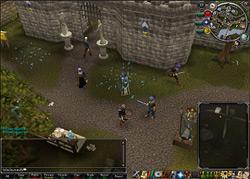Last week, the Dutch Supreme Court made a curious ruling: It convicted a teenage gamer of stealing something that doesn’t exist. The defendant stole two virtual items while playing RuneScape, a free massively multiplayer online video game. According to the Associated Press, the defendant’s attorney argued that the stolen amulet and shield “were neither tangible nor material and, unlike for example electricity, had no economic value.” The court, however, disagreed, ruling that the time the 13-year-old victim spent in the game trying to earn the objects gave them value.
As a reformed online-gaming thief, this ruling makes no sense to me. It places too much value on the time people spend playing video games. Video games are not work or investments for which people should be compensated; they are escapism.
During my disappointing teenage years, I played an MMO set in space-capitalist hell titled EVE Online. EVE is the rat race imploded upon itself, a game that brings out the worst of its subscribers’ humanity. In EVE, players can spend months working toward a goal anything from starting a small in-game business to the production of a massive ship that requires billions of EVE’s in-game currency and months of man-hours. These projects may seem foolish to those outside of the gaming world, but they represent a great deal to their creators. And these hopes and dreams can be destroyed rapidly by another player who just wants to be a jerk. That’s the whole point, actually.
EVE is one of the few MMOs that encourage players to use real money to purchase in-game currency, called “isk,” which in turn is used to build highly desirable objects in the virtual world. It is also the only game that actively allows thievery in the context of the game world. In fact, player satisfaction in EVE is based on taking chances and risking everything you’ve spent time building up. For instance, as Kotaku details, in 2010 pirates destroyed a ship that another player had filled with six years’ worth of in-game subscription renewals. At the time, the six years’ worth of play was valued at more than $1,000 in real money through EVE’s rather complicated financial system.
A few years ago, I could have been one of those pirates. In EVE, I enjoyed messing with people, making fake investments, engaging in corporation thievery, and even having an extended e-relationship with someone who thought I was a girl. I’d join corporations, running rainmaker scams by convincing the leadership that an antagonistic group was out to destroy everything we had built. Sometimes I even hired decoys to disrupt our supply lines just enough so that the monetary loss got their attention. After receiving the “bribe” money, they’d go away while I reaped the rewards of a now-trustworthy member of the target organization. After I had taken all I needed to take, I either blocked them or kept their enraged messages for posterity.
RuneScape, the game Dutch minor was playing, is a bit different from both EVE, whose point is to engage in Bernie Madoff-esque shenanigans, and the more well-known World of Warcraft. WoW has a very strict policy against scamming, thievery, and even harsh language; violators can be banned, and victims’ lost goods are refunded. The developers of RuneScape, however, didn’t explicitly state that the thief couldn’t do what he did, nor did they refund the victim his item. So here, we have a real-world court attempting to punish someone for behavior permitted within the realm. The real and virtual laws conflict, and it seems unfair to penalize the teenager for this. Reportedly, the player also beat up his victim, for which he should, of course, be punished. But attempting to bring real-world law into virtual realms—and putting monetary value on time spent immersed in a virtual world—seems dangerous.
